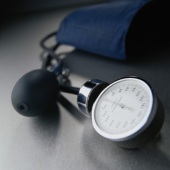
SUNDAY, March 14 (HealthDay News) –Following on recent, similar research, a large five-year study points to fluctuations in blood pressure over time as a key indicator of stroke risk.
In the study, British researchers tracked the health of more than 19,000 patients taking either beta blockers or calcium channel blocker medication to curb high blood pressure.
Patients who placed in the highest 10 percent in terms of swings in blood pressure between doctor visits had about four times the risk of stroke compared to those with the least variable blood pressure, the researchers reported.
Similar results occurred when the researchers analyzed patients’ risks for heart attack.
Overall, patients who took calcium channel blockers had a 22 percent lower risk of stroke vs. those who took beta blockers, and differences in blood pressure variability between the two groups seemed to explain the gap in risk.
The findings were to be released Sunday at the American College of Cardiology (ACC) annual meeting, in Atlanta.
“These findings have major clinical implications for the management of patients with high blood pressure,” study author Dr. Peter Sever, a professor of clinical pharmacology and therapeutics and co-director of the International Centre for Circulatory Health, Imperial College, London, said in an ACC news release. “Our data convincingly demonstrate that patients with more variation in their blood pressure levels are at greatest risk of future heart attacks and strokes, and that reducing variability is a key goal of treatment.”
The findings echo those of four studies led by Dr. Peter Rothwell of the University of Oxford in England and published Thursday in The Lancet and The Lancet Neurology. In one paper, Rothwell and his colleagues found that people with the greatest variation in systolic blood pressure (the higher of the 120/80 readings) over seven visits to their doctor were six times more likely to have a major stroke. People with the highest blood pressure readings were 15 times more likely to have a stroke.
“I think these findings are very important and very compelling, and may revolutionize how we treat blood pressure in the future,” Dr. Philip B. Gorelick, director of the Center for Stroke Research at the University of Illinois, said last week. “They provide a very important foundation for change in future treatment.”
More information
Find out more about controlling high blood pressure at the American Heart Association.

